We’d been in Nepal’s bustling capital city less than 24 hours. In what has become routine upon arriving in a new city, I was up around sunrise eager to wander out and explore the streets of a place that’s been a dream of mine for over a decade.
Like every other SE Asian country’s capital, Kathmandu’s streets are chaotic. Chaotic, I said. The roads are awful. Resembling heavily bombed strips of concrete, the streets are extremely fractured and surrounded by rubble and potholes. Particles of dust and dirt have a noticeably higher number of locals wearing protective surgical masks. Sickly thin dogs lay hungry in front of tiny, tiny shops while maniac-mounted motorbikes and taxis squeeze through the most unlikely of creases.
After a short morning’s stroll through the chaos, we hopped on a suspect-looking rickshaw and bounced through the cities dark, slender alleyways. For as fragile and run down as these city walls appear to be, never have I seen such a beautiful array of grit, texture and colors. Oh, man, the colors. Once out from the back alley’s maze and shadows, the sun began to burn through what had been a welcomed shield of cloud. Back on foot we broke into our unspoken, yet consistent, formation. One of us always takes the lead while the other trails a half block or so behind. For as much as we both are shooting nowadays, separating ourselves with that distance dims the glow on the target that is ‘two pale-skinned tourists walking side by side’. That space additionally lessens the likelihood of one of our backsides or faces showing up in the other’s photo (which still seems to happen anyway).
In the lead position with no particular direction in mind, I found myself in the middle of a heavily populated square, snaking through the crowd of street vendors until I got to a corner where I could watch this small slice of Kathmandu in motion.
It’s as noisy and fast-paced as Hanoi but the sights (blissfully colorful outfits worn by aging locals worshipping at shoebox-sized temples), the smells (thick waves of sage circulating through the air) and the sounds (chiming bells accompanied by whispering chants and prayers of devout Hindis) were all new to me – and exactly the reason why I was where I was.
Excuse me, sir. Where are you from?
If there is one thing this city is not short on, it’s people hitting you up for any and everything on the street. Milk money for their starving baby, taxi rides to textile shops, paintings, tiger balm, hash. You name it.
America, I sharply replied without looking him in the eye.
I was too “in” on what my senses were experiencing to appease his attempt at meaningless conversation. On the contrary, I’m usually playful and engaging with the people on the street. One of my favorite things to do is befriend a less fortunate, working local and buy them a coffee or beer after exchanging small talk.
Even after ignoring my ignoring him, Raj still stood there. Asking if I’d seen this famous temple or that famous stupa.
Sir, I really don’t want anything from you. I’m a shoe shiner and right now I have no customer and like to practice my English. Have you seen the white temple yet?
I’d heard about the white temple but had no idea where or what it was.
If you like I’m happy to show you the white temple and then I can show you pigeon temple. People who go become very happy. Both temples are a two-minute walk from here and are very nice. I promise you will feel happy.
Although there was absolutely nothing malicious about this kid, he was working me. He wants nothing but will show us around and in return we’ll hopefully feel obligated to give him a dollar or two. I knew this and I let him know that I knew this. But, he had me – I was now out of that square and endeared by this short, harmlessly sweet-natured Indian kid.
Twenty-two years old, Raj and his family immigrated to Kathmandu from India two years ago to try and find a better life. And although things would later get out of hand, I have no doubt in my mind that Raj is a good kid. A good kid wrapped up in a not so good life.
The three of us spent the next six hours going from temple to temple, sight-to-sight and street corner to street corner. Raj was informative, friendly and particularly protective. Making sure we stayed close together while grabbing Ashlie’s arm to guide her through the thickly trafficked streets.
While in search of a spot for us to sit down, relax and have a coffee, Raj finally made his move.
If I can ask you a question, Adrian, sir?
Sure, Raj, what is it?
Is it possible that you help me and my family with buying a bag of rice and bottle of oil to cook and eat?
Not surprised, yet still a little irked, I was quick to remind him of our initial conversation in the square earlier that morning.
I don’t mind giving you a couple of dollars for how great you’ve been with us all day, Raj. But, I’m sorry, a big bag of rice ($20) and container of oil ($10) is too much.
I don’t want your money. Really. I just want rice and oil to feed my family.
You can put the tip money I give you towards rice and oil, can’t you?
Don’t worry, sir. It’s ok and I’m sorry for asking of you. I really don’t want any money, he insisted.
Knowing there is no way in hell I’d not compensate him for his efforts on the day, we all carried on the search for coffee. (For the record, nearly half of this country’s population lives off a wage of one dollar a day. Average yearly income here in Nepal is less than 200 dollars(!).
After photographing a particular street corner I turned around to find Raj a way’s back arguing with a light-skinned Nepalese. I recognized this guy. I remembered his greasy, long hair and faded yellow shirt from a stop we’d made earlier in the day.
After a visualized confirmation with Ashlie, I walked towards, but not up to, Raj. His face was stern. He then walked straight past me and said we needed to go.
Who is that guy, I asked.
He is Nepalese people. He is not a nice man and we need to leave now.
I immediately felt threatened. My heart rate increased when I turned around to see the yellow-shirted prick, square-shouldered, looking and walking our way. Although there were likely a hundred other bodies between he and I, as each head passed, I could see his beady eyes locked in our direction.
I turned my entire body towards him and he stopped. Motioning with my hand to go away, he turned his body in the other direction and walked away.
Rejoining Ashlie and Raj, I insisted on Raj telling me who this man was, and why he was following us.
He hits me everyday. Because I am Indian he wants money from me everyday. We need to go because he’s a very dangerous…..
There he is, Ashlie nervously says. He’s following us again.
What happened next was one of the stupidest things I’ve done in quite some time. My body and blood became infuriated. Some sort of protective instinct or mechanism took over. When he saw me charging at him, he immediately stopped in his tracks. My heart pounding out of my chest, I screamed at him, Stay the f*ck away from us! Go away now!
Adrian! Adrian! I could hear Ashlie yelling my name and it snapped me back down to earth.
With both he and I stopped in our tracks he loudly says, Not you. Nothing you. Him. I follow him.
My body wouldn’t let me budge. I stood there with a snarl on my face until he turned around and disappeared into the crowd.
Leave him alone, he is a dangerous man, Raj says while grabbing my arm and pulling me in the other direction.
Seriously, Adrian. What the hell are you thinking, Ashlie angrily interjects.
As we quickly moved through the crowded streets we got to a corner where we could all stand side by side. Assuming there’d be no way the villain could’ve kept up, unbelievably, I look back over the crowd and low and behold the greasy-haired, yellow-shirted bastard was coming our way.
This time we all turned and hurried in the opposite direction. Raj took the lead and Ashlie and I followed him down a narrow side street and up some stairs to a small, dark café. We went straight to the back of the restaurant and sat at the last booth in the unlit corner (me facing the door). With all the different ways we could’ve gone, along with just how quickly we’d moved, the only way the dangerous man could’ve found us is if the two of them were in on this thing together.
After a few minutes of cool down, it was there where we finally had our coffee and our lunch. During, Raj explained the discrimination he has to deal with on a daily basis because he is Indian working on Nepalese turf.
After paying for lunch I took the 500 rupiah in change ($6), rolled it up and tried to put it in Raj’s hand.
Sir, please. I don’t want your money. Really. All I wanted was rice and oil. No money.
Raj, take this money and go buy your family some food. If I buy the food for you, I will get overcharged. Take this and go buy what you can with it. Please.
Whether it was humility or appreciation, his pitch-black swelled with tears.
Thank you. Thank you so much. I invite you and Ashlie to my home for tomorrow and my mom will cook us the food. We live in a tent but will you come for tea and lunch?
Somehow, someway I trusted this kid. And, it has been in situations like this, being invited to a local’s home for dinner or drinks, that have materialized into some of my fondest and most treasured travel memories.
We set the time and were to meet Raj and his family in tent-city two days later. Still conscious of the possibility that the greasy guy might be somewhere outside, we shook Raj’s hand good-bye and quickly headed back towards home.
Even though the 500 rupiah ($6) I’d given Raj two days earlier was six times more than the average daily wage here in Nepal, Ashlie and I both knew there would be more monetary expectations approaching. We’d discussed arriving with a fat bag of rice and bottle of oil, but were deterred from doing so by a Nepalese friend who told us taking food to someone’s house could be considered disrespectful. But, I knew we weren’t leaving this once-in-a-lifetime situation without making a small, charitable family donation. And frankly we were ok with that. Again, if it were not for encounters and experiences like this, my love affair with travel just wouldn’t be the same.
During the bumpiest, neck-jolting taxi ride to Raj’s side of town we’d made three fruitless stops at cash points. So not only did we show up empty handed, we also needed to hit an ATM just for our own (needing of money) sake.
Tent-city is literally across the street from Kathmandu’s holiest of stupas, Boudhanath. The ancient stupa is one of the world’s largest and a rather impressive sight to see. It was in front of this stupa where Raj and his “brother”, Sunny, were side-by-side eagerly waiting for us to exit the cab.
After exchanging hellos they proposed that we go in and explore the stupa. I’d read online that this place was one of the most peaceful getaways from the noisy ruckus that is Kathmandu. I was really looking forward to being there in peace, not feeling the need to talk or the need to listen.
Is it possible to have lunch now and visit the temples later on our own time? I asked.
Why not? Come let us take you to meet our family, says Sunny. Whose English was miles ahead of Raj’s.
Dodging the weaving, honking motorbikes, we cut across the road’s traffic. We began walking down a dirt road that was riddled with year’s worth of pollution. It was here where we were able to get a bird’s eye view of tent-city. I knew that seeing a collection of impoverished people living under the conditions of tarps and dirt floors would be powerful – and I’d also witnessed poor before – I’d seen packs of orphans in Nicaragua rummaging through fields of garbage, and it was only six weeks before that I’d seen homeless clans of Cambodian children huffing glue until unconscious. Internally, I felt mentally ready for just about anything. But nothing could have prepared me for the sights and smells these slums were about to introduce us to.
Approaching the fragilely strung-together tents, the pollution and odor swelled and I had to stop breathing in through my nose. Never in my life had I seen so many swarming flies. Bottomless, barefooted infants were wandering around with snot crusted between their nose and upper lip. Filthy-dressed and rail-thin men and women began popping out from their respective tents, happily grinning and greeting us, Namaste!
With my defenses and senses both heightened, I looked around and could feel my heart beginning to crumble. This was the poorest of the poor.
How in the hell could anyone live like this?
Sunny and Raj patiently waited for us while their neighbors continually asked to have their photo taken with us.
Somehow, someway they seemed ok, happy even. How? Their humble smiles and welcoming eye contact helped tame the sympathetic pity that began threatening my experience.
Come, come! Let me show you to our home, Sunny proudly commands.
Ducking under the low ropes that strung this community of tents together, we followed he and Raj through puddles of murky, green water that meshed with mud, making every next step suctioned. As we approached their home the mother, sister and Sunny’s wife greeted us with smiles, bowed heads and their hands pressed together in prayer form, Namaste.
As noon’s sun really began to bake, no electricity meant that any sort of air or fan was out of the question. But, even though there were now nine of us huddled beneath, the tarp roof allowed the confines of their humble home to provide some relief from the heat.
Over the next two and a half hours we completely immersed ourselves within that village. Walking from tent to tent, exchangingNamaste’s and smiles. Ashlie played and took photos of the kids while the mother and daughter made us tea and prepared lunch. Sunny and Raj insisted that I join them for an impromptu walk through the village – a ploy so that the two brothers could inconspicuously go buy and guzzle glasses of homemade alcohol, Rice beer.
Once the three of us meandered our way back to the tent, lunch was to be served. Over a hole dug into the ground, a tiny fire boiled vegetables and rice. As the plates of food were passed our way, Ashlie and I unconfidently stared down at the steaming meal. If there had ever been a moment during our travels when we undoubtedly questioned the sanitary conditions of what we were about to eat, this was it. We said a small karmic prayer, blessed away the bacteria and proceeded to have one of the most flavorful meals since Thailand.
Passing around plates of sliced onion and cucumber, English was suddenly no longer being spoken between Raj and Sunny. The angles of their bodies began positioning themselves towards Ashlie and me, and just like that, the sister was suddenly sitting right behind me, fanning me cool with a weathered piece of cardboard. Energetically I could feel the shift – the hustle was strategically being put into motion.
I’m sorry, Adrian, sir. Can I ask you something?
The mother, no longer smiling, took her cue and scooted closer to me. She began rocking back and forth, unexplainably motioning like she was hungry and suffering.
Every family immediately stopped eating, all eyes saddened and were now staring in my direction. Without having to look at Ashlie, who was sitting directly to my right, I could sense her discomfort.
Verbally, I didn’t respond to Raj’s question. I simply nodded my head and continued to shovel yellow rice into my mouth.
Sensing my disappointment and distrust, Sunny, and his used car salesman’s act, confidently took over.
We are the only ones who can support our family, dear sir. We were wondering if you could change the lives of everyone here and help us buy a shoebox? Because we are Indian shoe shiners without a shoebox, we have a difficult time making business. We are happy family, but we are also…
How much? I interrupted.
Oh, I don’t know the price, Raj replied.
Come on, Raj. You know how much a shoebox is if that is indeed what you are wanting from me.
With pathetic looks still hung on all their faces, and the mother still rocking, motioning like she is in deep pain, instantly everything beautiful that had transpired during our time in that village now seemed like one big set-up.
There had been a few glaring discrepancies in things that Raj and the family had said, but again, I’d known from the start we weren’t dealing with a whole lot of integrity, and yet we’d still be willing to make a charitable donation or exchange with this family who’d welcomed us into their home for lunch. But, I also knew that I wanted that exchange to be on our own terms, not on the terms of any trickery or misleading manipulation.
Raj quickly darted out from the tent, only to return a few minutes later with another Indian man. This Indian man was carrying a very weathered, yet professional looking shoebox, equipped with every tool that shoe shiner could hope for.
The family’s faces lit up like Christmas trees. The Indian man methodically began unpacking the box and showing off all its blackened treasures.
This man’s father is a shoebox builder. He is building his son a new shoebox so he is willing to sell us this one, Sunny announced.
How much? I jabbed in.
A box like this could give our family a much better life, not just for today or tomorrow but for a very long time. He will sell it to us with all the tools for only 5,000 rupiah.
Wow, $60 bucks, I said to myself. That is A LOT of money to these people, but roughly only one day’s worth of our travel budget.
With this family of impoverished Indians semi-circled around, and staring up at me, an unavoidable emotion of sympathy began gaining momentum.
Though roughly the equivalent of two month’s pay here in Nepal, what if a $60 shoebox really would be giving this entire family the opportunity for a better life?
My head and heart wrestled feverishly as this family that had just fed us waited with baited breath.
Sunny, Raj, Mama, we are happy to buy a bag of rice and oil for this family, but 5,000 rupiah is just too much. I’m really sorry.
For a family that didn’t understand much English, they clearly had no problem digesting what I’d just said. In unison, the entire tent heartbrokenly exhaled as if being informed that a loved one back in India had just died. Their body language shifted away from Ashlie and me and there was instantly a darker energy in the air.
Rice and oil will only feed us for a short time, sir. This shoebox can change our lives, Sunny desperately explained.
I’m sorry, Sunny. We can’t.
The sister and Sunny’s wife looked angry. The mother, swooping her hand towards the meal she’d cooked for us, wore a look of disgust.
Listen, we are happy to process the photos we’ve taken of you and your family and meet you back in the city tomorrow to give them to you, Raj. Until then let’s go up to the main road and get you guys some rice and oil.
More just wanting to remove us from the fly-infested bad energy that now clouded the tent, nothing inside my body was excited about going to buy rice and oil.
Genuinely appreciative of the time we’d had with the family up until they honed in on us, we appreciatively said good-bye to everyone.
On our way up from tent-city I was surprised to look back and see Raj’s mom following close behind. Back on the main street we still needed to pulse out cash. After I walked out from the closed doors of the bank machine, Raj’s eyes swelled with tears. My insides immediately cringed.
Please, Adrian, sir. We don’t want rice or oil. This box is a new life for me and my family.
His mom was now in my face motioning her hands in the form of a small box. Box, box. Feed family. Please, please, box, she begged.
There’s another box, Adrian. A smaller box, says Raj. It’s cheaper, maximum 3,000 rupiah ($35 bucks). Please. I promise this shoebox will change the life for me.
I felt cornered. I felt confused.
With his mom still positioning her hands in the form of a small box, I look to Ashlie for help.
Raj, we need a minute, Ashlie asserted.
We both knew we could afford it and we both were moved and endeared enough by Raj and his family, up to a certain point. But, we also questioned everything. Were we getting conned by this entire community? There were a few things that just didn’t add up. And those questions, compounded by the guilt Raj and his mom were shoving down my throat, made me feel close to combusting.
Where is this small box, I angrily asked Raj.
Come. I will show you!
Out of utter frustration Ashlie and I exchanged a few choice words. But, there we were, once again, following Raj back down into tent-city.
Rounding the corner back down into the slum, a rough-looking, intoxicated Nepalese man stood seemingly waiting for our return. Being so emotionally wrapped up in the moment, I didn’t even recognize him.
Back inside the family’s tent Raj says he will go to fetch the small shoebox for us to inspect.
Then, as the dangerous yellow-shirted Nepalese man stumbles up to the door, it clicked.
Ho-ly sh*t. My heart dropped as I began scanning the tent for something to knock his ass out with.
He cheat man! He cheat man! Greasy haired yells, pointing his finger in Raj’s face.
He then sheepishly looks at me, You no problem. You, no. He! He cheat man!
Let’s get out of here now, Ashlie whispers with clinched teeth.
We locked arms and stormed from the tent.
A shockingly volatile screaming match ensued. Raj assertively led us up and out from tent-city for the last time while, loud enough for the entire neighborhood to hear, Raj’s mom and the yellow-shirt violently shouted at one another as they trailed us up into the street.
Ashlie, Raj and I scattered across the traffic. Back on the opposite side or the road, yellow-shirt was now being harassed and swung at by a handful of women from tent-city. He aggressively returned the favor. The scene was loud enough to attract the attention of the police officer sat outside the ATM I’d gotten out money from. Aggressively yanking him sideways, the cop removed the dingy, yellow-shirted man from the dramatics of this equation once and for all.
Now inside the holy, peaceful surroundings of Boudhanath stupa, my body was buzzing with frustration. Ashlie and I locked eyes, unsure of how to even begin digesting what had just happened.
Still not having made our donation to the family, Raj, and now his mother, were not far behind.
As his mom stood back, still forming her hands in the shape of a small box, we sternly confronted Raj with a barrage of questions.
He stuck to his guns. Claiming that this man bullies him into forking over small amounts of money on a daily basis. A tax, if you will, for the Indian, Raj, to be hustling on the streets of Kathmandu.
That scenario certainly seemed possible as Raj was meek and sweet natured and the bully appeared to be the opposite.
Still, Raj declined to accept the 1000 rupiah ($12) note I tried giving him.
No money, Adrian. Please, just the small shoebox.
I’m done, Raj. Give this money to your mom and you guys use it however you want. It’s this or nothing.
With the 1000 rupiah note gripped tightly in her wrinkled left hand, the mother said good-bye.
Raj, deep down, is a good kid. I believe that. Whether he looked at Ashlie and I as targets our entire time together is something we’ll never know. I choose to believe he saw the same good in us that we saw in him.
Even after giving his mom the money, he wanted to spend time with us, still trying to educate us on the history of the stupa. But, uninterested in battling the questions having Raj next to me created, I needed him to leave us be.
Raj, I’m sorry. We really want to be by ourselves now. We thank you for lunch and will meet you in the city tomorrow to give you prints of the photos we took today.
My family will be very happy for photos. I very sorry for everything that happen today. I hope that you and Ashlie are not angry at me. I hope I do get to see you tomorrow.
Minus much conversation, Ashlie and I spent the next couple hours decompressing under the stupa’s thousands of prayer flags. Even being engulfed by such a strong flow of spirituality, I couldn’t stop questioning everything.
Were we the victims of a cleverly orchestrated scam? Or did we just shoot down the opportunity of changing a family’s life forever? Should we have just bought Raj that damn shoebox?
We both woke up that next morning with an emotional hangover. Knowing that we were meeting Raj later that afternoon we still struggled with whether or not we should do more.
Was I being naïve? Perhaps. The possibility of this being one big con couldn’t be denied. But, no matter if this was a professional hustle or not, we recognized Raj and his family as humans, and the conditions which they were living under screamed inhumane. After hours of discussion and some real soul searching, we unconfidently decided that we’d compensated Raj and his family enough. That small shoebox was not to be our responsibility.
Photos in hand, we met Raj on one of the Kathmandu’s clustered corners.
His big smile was pure. It was obvious to see that he’d thought we were going to stand him up.
I worry. I worry you not coming. I would have waited here all night.
His photos were wrapped in the usual gold and white processing envelope. We’d included an extra 1000 rupiahs. Just because.
As he opened the envelope to look at the photos he spotted the money and immediately said, No. No money!
Raj, take the money. Please.
I don’t want your money. I don’t. I just want small shoebox.
Trying to return the money I grabbed his right forearm and firmly held it against his body.
Raj, keep it.
A few minutes of small talk and it was time to leave Raj for good. We all hugged and his eyes swelled with tears. Thank you, God bless you with good luck for all your life.
Even if we’d been hustled, somehow, unexplainably, we liked this little shit.
My Adam’s apple bulging in the back of my throat, we turned and walked away.
Peeking from corner of my eye as we walk, I see Ashlie’s bottom lip shivering up and down.
You okay?
She stopped, dropped her face into the palms of her hands and burst into tears. Her emotions seemed uncontrollable, and my own quickly followed suit.
So there it ended. Us drained, from the inside out, standing in the waters of one of Kathmandu’s mucky alleyways – sympathizing with this young man who’d stolen our hearts.
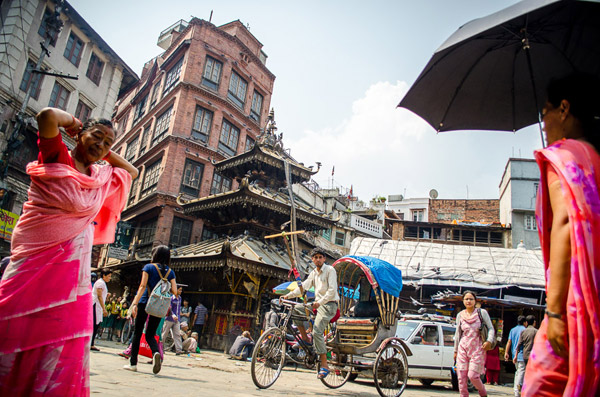
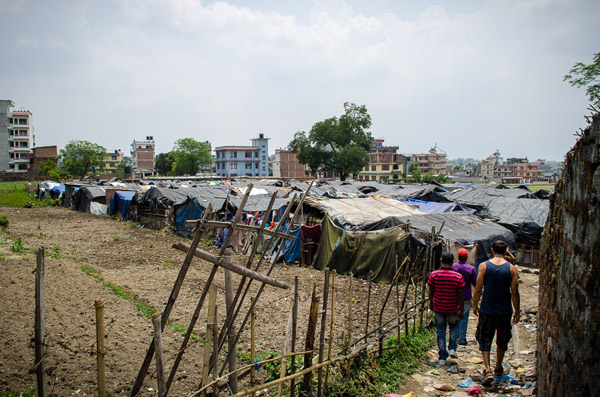
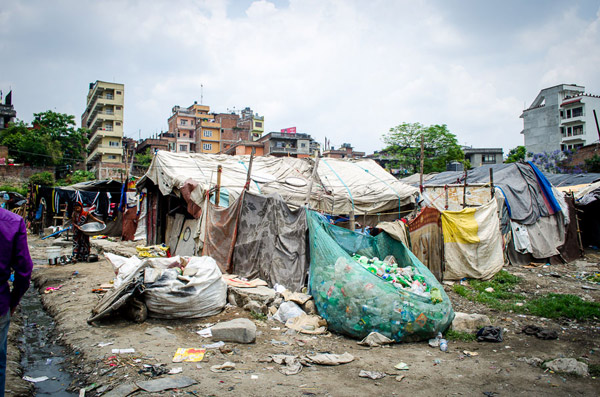
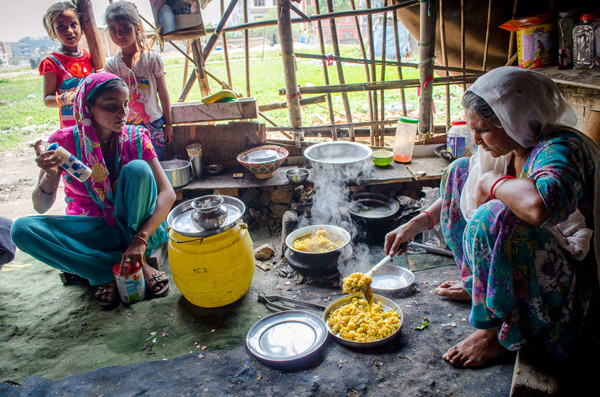
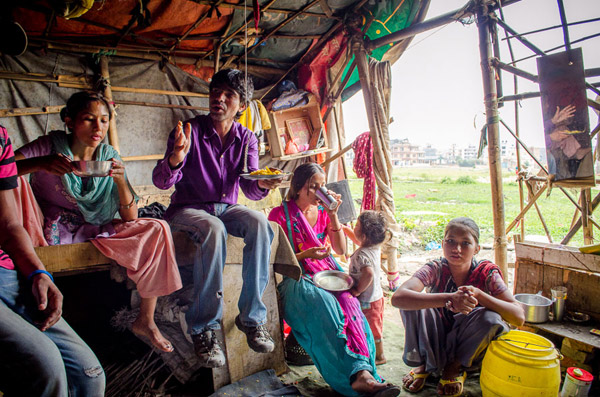
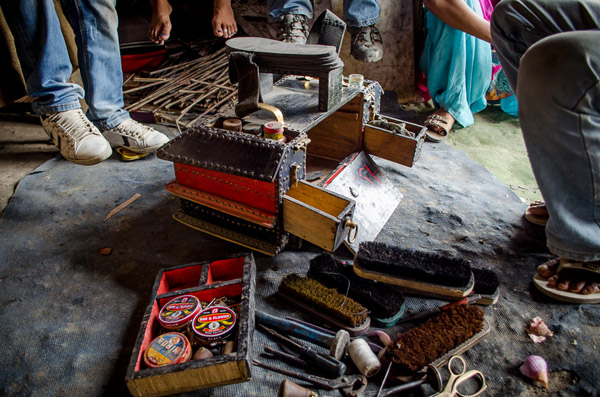
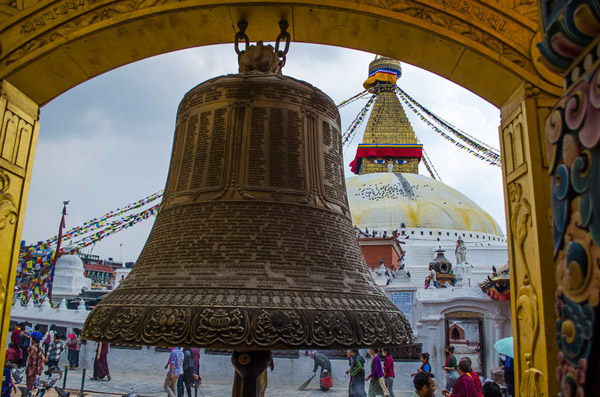





Just experienced a similar occurrence here in KTM. Somebody’s shoe box got stolen on his way from India to Nepal. This seems to be a common story in order to be different than all the other beggars. You’ll find a few descriptions of this on the internet. This doesn’t change the fact that someone who asks for help in the streets certainly lives a very low standard life. So I guess I’ll give this man a bag of (opened) rice or a few rupia, if only for the good story he told.
Safe travels always,
Thomas
Hahaha my gosh, the same thing just happened to us in Kathmandu.. But a “sunny” instead of a Robbie. We got a full city tour then taken to his home to see his wife and kids. His wife cooked us some dahl baht then he mentioned that he would love a shoebox to be able to earn money and wondered if we could buy him it. He didn’t know how much it costs but an Indian in the shanty town was selling one. I went with him to see it and the guy wanted 46,000 rupees about 400 eur for it. I didn’t think it was worth half of that. The guy said to buy that night as someone else wanted it. I said I need to consult with my girlfriend and transfer money if going ahead. We went to his home and I told him if it is a scam then it would be bad karma for him. He said OK. I said I need to sleep on it. We bought him 1000 rupees of food, but we had a lovely day and saw things that we would not have seen otherwise so felt that was a good exchange. Typed in shoe box scam in Google and straight away found your site among many others. I don’t think that I will be buying the shoebox for him. The family lived in absolute poverty so I have no bad feeling towards him. We will probably be back to his shack to give them some nappies and rice, but somehow he was asking for almost as much as I would earn in half a month.
Wow, I had the nearly the exact same experience in September 2013 and likely, there are many more whom have as well. I’ve linked pictures below and you can see, it is definitely the same tent village, right next to the Boudhanath stupa. These guys likely were bringing in lots of money. I can’t remember their names but they got us for about US$120.
Are these the same guys? https://www.flickr.com/photos/62193096@N07/23563510308/in/dateposted-public/
The only major difference was the ‘Indian’ we bought the box from was led into the room as a ‘blind man’. He stumbled around a bit and acted extremely frail. We bought the box for them and walked away with some of the same confusing/complex feelings. Wondering if we’d been scammed, but how could the entire village be in on it? I for some reason felt extremely guilty.
Weeks later, on the way to the airport, I walked past the same ‘blind man’ huddled over the exact same shoebox (the one in your pictures!). Only this time he looked me in the eye and asked if I would like a shoe shine. He obviously didn’t recognize me. I was so angry about that for such a long time. However, once I let go of that anger I realized how amazingly clever, elaborate, and manipulative the scam is.
We did not encounter the man in yellow. What is your opinion of him now? Do you think he could have possibly been the only person in the village trying to keep you from being ripped off? That would explain why others in the community were harassing him to leave. By calling out the ‘cheat man’ he was threatening what was likely one of the only lucrative sources of income for the community.